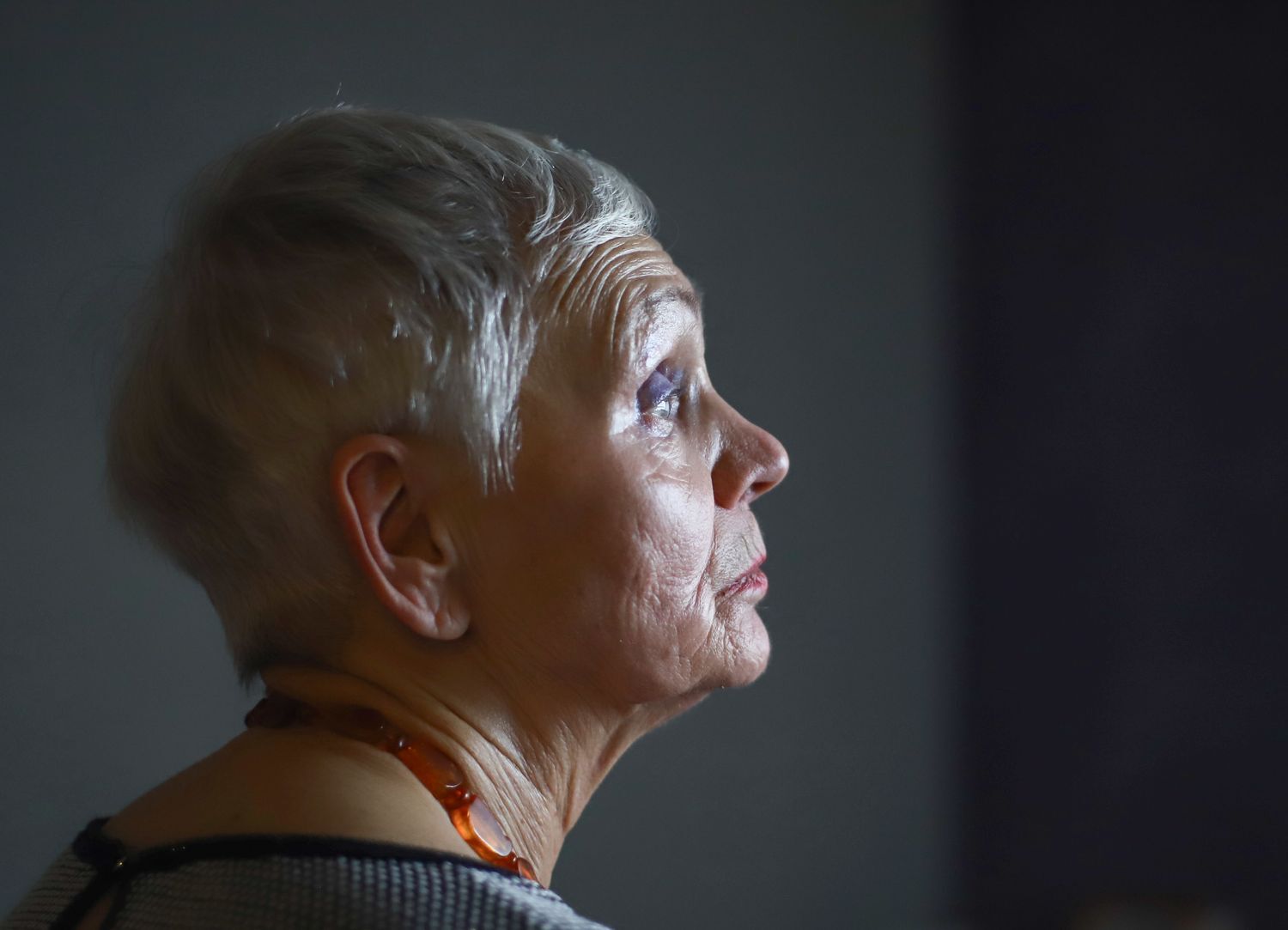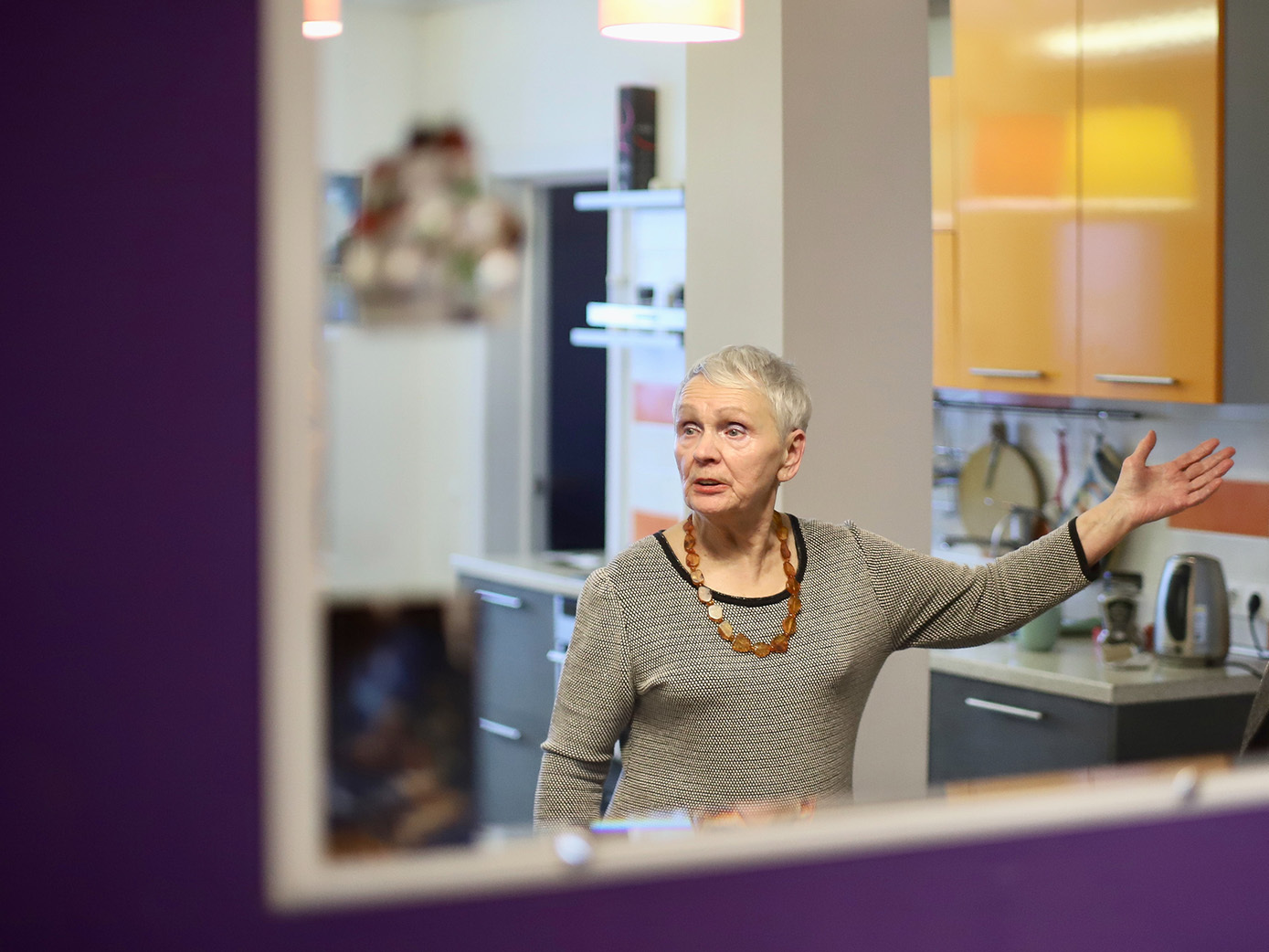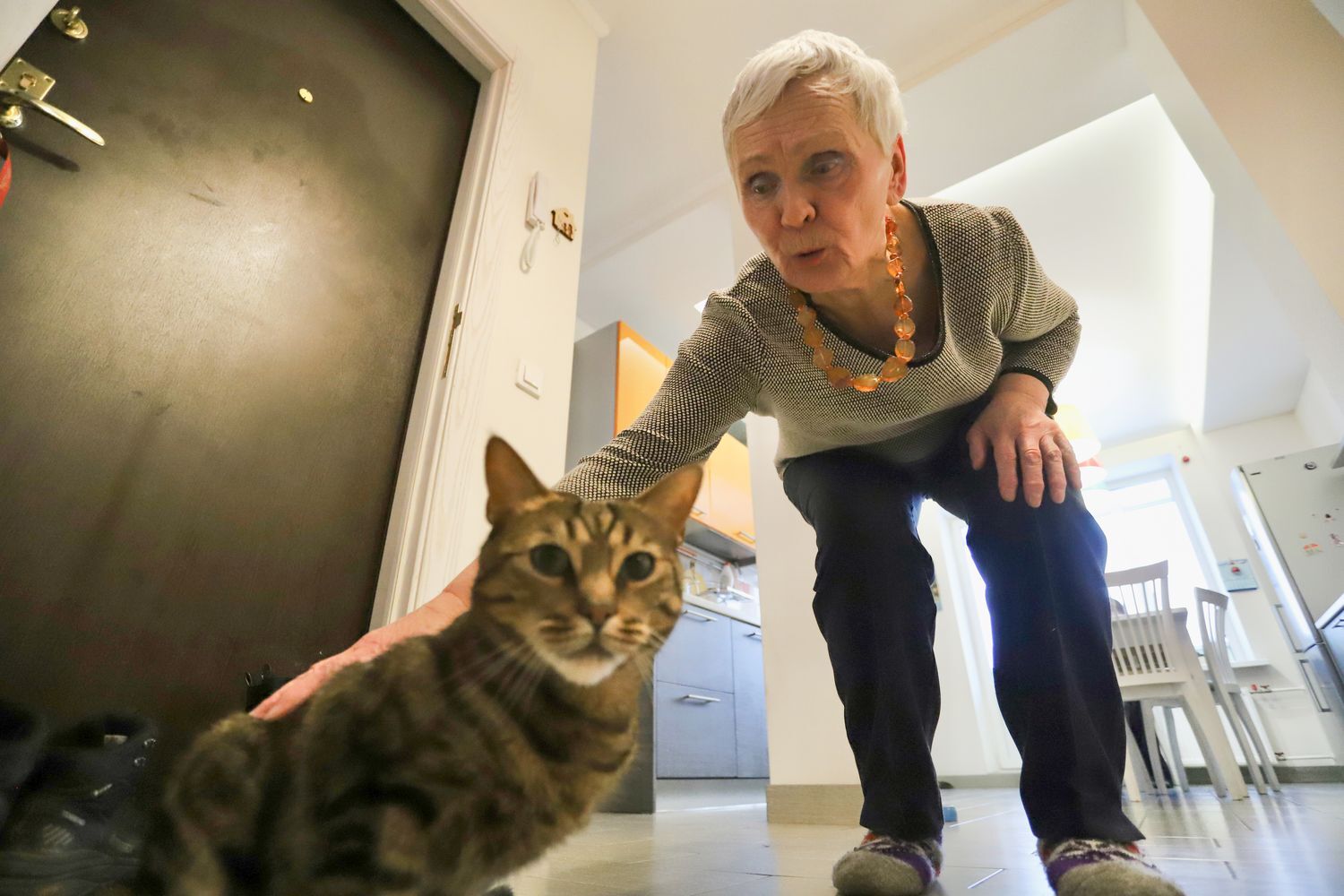On February 16th, the day news broke of Alexei Navalny’s death, 82-year-old Ludmila Vasilyeva joined hundreds of St. Petersburg residents on Nevsky Prospekt and near the Solovetsky Stone. “Enough blood, enough hatred,” she shouted.
Ludmila Vasilyeva is a long-time participant in St. Petersburg protest rallies and a child of Leningrad blockade. In 2022, she was detained several times during anti-war rallies in the city center.
Paper asked Ludmila Vasilyeva about her childhood in post-war Leningrad, her stance against war, and about her reasons for talking to police officers.
“Icicles hung from the ceiling to the floor in our room.” On the blockade and childhood in post-war Leningrad
“I was born two months before the war, on April 22, 1941. There were five of us, I was the youngest. My mother donated blood during the war to earn the right to an additional ration and feed us. My mother’s sister and her two children, who lived in the neighboring house, all died [of starvation and cold]. Both my grandmother and grandfather, who lived in the same room with us at Marata Street, 70A, also died.
“In May, after the harshest winter of 1942, we were evacuated from Leningrad to Yaroslavl Oblast. One of my earliest memories is of our return from evacuation in the winter of 1944. Icicles hung from the ceiling to the floor in our room at Marata Street.
“I remember how we were all raised together in the yard when we were little, while my mother worked from morning till night to feed us. We were heating the stove. The masonry ceramic stove was dismantled, replaced by burzhuyka [makeshift stove], and all the parquet flooring was burnt. Next to us was the Krupskaya Confectionery factory, it always smelled like chocolate there, and they threw out all sorts of leftovers. Sometimes we collected nuts there because we ate everything we could. In the summer, we boiled saltbush, nettle—my mother made us soup from them. They were very tasty. Or so it seemed to us then. Until 1948 in Leningrad, we received all our food only with ration cards.

“Children in the early post-war years didn’t go to summer camps or kindergartens. We used to take the tram to the quarries in the Rzhevka-Porokhovye area for sunbathing and swimming. We started running to the library as we learned how to read books.
“All of my mother’s brothers were lost in the war. Although my father returned, he didn’t live with us. He left us, and I hardly remember him.”
“This is the generation of saints who endured all the horrors on their shoulders.” On mother and the dislike of celebrating May 9th
“I was fortunate to always have many good people around me, including my mother, who was born in 1908. I believe that her generation is the generation of saints who endured all the horrors on their shoulders. They lived through the revolution, the Civil War, Khalkhin Gol, the Winter War, and World War II. And she had five children. Abortions were not allowed. Would she have given birth to all five of us in such poverty? No, of course not. So many people were dying. And to this day, the government teaches us how to live and how many children to have.
“My mother was a proud and beautiful woman. And very free. She taught us freedom. She never bowed to anyone. She never relied on anyone, always analyzing even the worst situations and finding a way out. That’s why I’ve always told myself: I am my own government, I just wish the government wouldn’t interfere with my soul or with me.
“After the war, my mother was diagnosed with tuberculosis, she had a hole in her lungs. She was sick for a long time. Our family was given an apartment in Khrushchevka because of her open form of tuberculosis. But my mother was so worried about the children and wanted to raise us all that she managed to recover from illness. None of us got infected. She looked very young, and was even proposed to at 76. We buried her in December 1990.
“Everyone talks about May 9th as a holiday. But what kind of holiday is it for us? For me or for my mother. My mother hadn’t strength to recall all that happened during that war: grandfather, grandmother, sister, and all the brothers died. Many were young, around 23 years old. Wives were left alone with children. It’s unbearable.
“And now the war! That’s where Putin—I don’t even want to pronounce his name—is, there’s the war. Isn’t he tired of these wars himself? I feel very sorry for the country. I’ve lived in St. Petersburg all my life. After World War II we rebuilt the city: we went to collective farms, did cleaning, there were construction sites everywhere. And now these wars again. And lies, endless lies. To me, Putin is a German. So many of our people have died on the front now! And how many Ukrainians as well!”
“I realized at the factory that the government deceives.” On youth and disillusionment in the USSR
“I have 57 years of work experience. I’ve worked my whole life. I had to support my family. Right after school, I got a job at the factory. Before the revolution, it was called Promet, in the USSR they renamed it to P.O. Box 443, then to Russia. In the 2000s, it was dismantled and liquidated. This factory, like many in the USSR, worked for the military, but it had a cover: they produced Zarya televisions. My middle sister Tamara worked as an assembler at this factory, and I wanted to do the same. So, I went there when I was 17.
“I realized at the factory that the government deceives. When we came, five young girls ready for the feats of communist labor, and rationalized our work, we exceeded the plan to such an extent that no sixth category workers did. But when it came time to pay bonuses, they told us that there would be no high additional payments. Other, more experienced workers didn’t earn money because of us. We were very offended.

“Many used to work just to avoid being bothered. But I always tried to do everything conscientiously. But once, a colleague told me, ‘I cause less harm with my non-work than you do with your work.’ And he was partly right. You always need to think about what you’re doing. After all, in Soviet times, all the factories worked for the military.
“In school, I believed in the Soviet Union. But in my youth, when I started working at the factory, I stopped trusting the party and refused to join it. Though, I was still persuaded to join the Komsomol, where I was elected secretary. But I tried to help people, organized concerts, which we toured the countryside with, and arranged sports competitions. I had an acquaintance who distributed tickets to theaters. She treated me very well, so we attended all the premieres at the Tovstonogov Bolshoi Drama Theater, also we were at the premiere of the ballet Carmen with Galina Kareva. I got everyone used to going to the theater.
“I left the factory after 11 years with the same third category as when I arrived. They didn’t want to promote young people. At 27, I got a job at the Krylov Institute. This institution specialized in shipbuilding and housed the world’s longest enclosed channels where they tested deep-sea submarines. While working there, I graduated from a marine instrumentation technical school. I also met my husband at the institute—everyone in our laboratory was young.
“I was also very fortunate with my husband, he instilled in me a love of poetry. I believed what was written in the newspapers for a long time. I was a naive Soviet girl and thought: if they said so, then it must be true. But my husband would say to me in response: ‘There’s a lot written on the fence too.’
“Everyone loved my husband—our friends, children, animals. He worked in Norilsk for five years as the assistant manager of the computing machine. I was visiting him there. While he was working and earning money in the north, he sent it to me, and I saved it. Then we joined a building cooperative, and bought an apartment on Budapeshtskaya Street. We had a big library there. At the moment my husband has been dead for over 20 years.
“You can’t even imagine how much it hurt me.” On politics and participation in anti-war rallies
“I don’t watch TV, I have a laptop with YouTube and VPN. I subscribe to many channels: both about culture and politics. When I leave for the store, I set up two chairs for my two cats—Flashka and Afrik—and play classical music on YouTube for them. They sit and listen.

“I became seriously interested in politics in the 1980s, when Mikhail Gorbachev came to power. In 1991, during the August Coup attempt by the GKChP, I was near the Mariinsky Palace. I always went to vote, and participated in election commissions.
“In the 1990s, I was a member of the Democratic Choice of Russia—party of Yegor Gaidar, who left Russia with a growing economy for Putin. But Putin ruined everything, taking advantage of what the ‘young reformers’ had done. Now he keeps talking about the 90s. Yet Putin himself was a criminal in the 90s.
“I constantly attend rallies: for Alexei Navalny, for our city. In 2014, after the annexation of Crimea, I came out with a picket sign saying ‘No fratricidal war.’ It turns out I was shown on TV with this sign. So when I came to the institute, my colleagues started convincing me that there would be no war. Soon I left the institute in protest, after working there for 46 years. By then, I was earning a first-category engineer’s salary: one million six hundred thousand rubles a year. I left because of Ukraine. I didn’t want to work in a large state-owned company.
“When in 2022 the full-scale war began, it hurt me so much. You can’t even imagine how much it hurt me. I’ve seen all this before: blood, sorrow, tears. I went out into the street and shouted that I am against the war. When mobilization was announced, I also shouted: ‘Don’t go to war!’, ‘Mothers! Mothers! Stop the war!’ Are their children’s lives worth a million rubles?
“I’m very scared. I worry about the youth, about my son and my four grandchildren. Recently, I was in such a mood that I wrote a letter to people, made copies, and gave them to people in the metro. It started like this: ‘Hello, people! How could we give the country to monsters? We declared that we wouldn’t abandon our own, but we abandoned everyone—our people and our country to an insane, unjust war. They sent our children to war. They gave a 19-year-old boy to be torn apart by Kadyrov. And no one stands up. And the authorities are only happy about all of this.’
“I would like to say to Putin: ‘Do a kind deed. Come out and say: “Forgive me, people. I was completely wrong. I’m leaving.”’ And for these words, all his wealth would be forgiven, let him choke on it. What good are these riches to him? After all, he won’t take them with him. We all came naked, we will leave naked. And there’s nothing behind but wars. What does he dream of? Does he really sleep soundly?”
“The ‘cosmonauts’ came and brought sweets.” Why Mrs. Vasilyeva communicates with the law enforcers
“In September of last year, I became a co-founder of the European St. Petersburg movement. Former city parliament representative Maxim Reznik invited me to join them, and I gladly accepted.
“In January, I went to collect signatures for presidential candidate Boris Nadezhdin. I looked at what he was offering, and I liked his candidacy. He’s intelligent, a physicist. The youth nowadays are passionate, and he’s prudent—and he’s right. To get things moving, you need to be able to talk.
“I often communicate with the ‘cosmonauts’ myself. Why should I fear them? You have to explain everything to them so they become more humane. After all, they won’t disappear anywhere; they’ll still be in society. When I attended anti-war rallies in February 2022, they detained me. They carried out their orders, and then they drove me home in a car. And every time, I had a conversation with them, and they agreed with me. I told them: ‘Don’t carry out criminal orders. Just imagine what it would be like if you went out onto the square armed. The whole world would applaud you.’ But the’’re afraid.
“After the detentions, the ‘cosmonauts’ came to me in groups. The first time, they came at 10 p.m. and brought sweets. They sat with me for about an hour, we talked, and I showed them pictures. One girl kept calling me and asking if I needed help. I refused. Why would I need their help? I have friends here, acquaintances, a grandson; I’m never alone.
“One police officer called me and said, ‘You’re right about everything, but we don’t get paid that much anywhere else.’ To which I replied, ‘Don’t sell your conscience for money.’ Another one also got in touch with me and promised to resign. I don’t know if he kept his promise.”
“I thought I had shed all my tears.” About participating in actions in memory of Alexei Navalny
“Throughout my life, I’ve seen a lot of sorrow. I feel sorry for the country. How can I not be concerned? We were an empire of evil in the USSR, and now we are terrorists. I want to be proud of Russia. I want people to be happy, and I want our youth to take power into their own hands. But they are not allowed anywhere, they are beaten, detained, the best are killed, and the most worthy are driven out of the country.
“Until the latest news about the death of Alexei Navalny in prison, I thought I had shed all my tears. But now, as I speak, tears well up again. It’s very hard to bear. Something needs to be done, we can’t just sit still. On February 24, on the ninth day after Navalny’s death, I want to go to the church to light a candle.
“On February 16, the day of his death, I went with flowers to the Gostiny Dvor, and then to the memorial for the victims of repression.
“I constantly attend rallies. I saw Navalny when he visited St. Petersburg. I knew many people. And I am so sorry that they are getting rid of smart, worthy people who want prosperity for the country. I feel sorry for Ilya Yashin, who was sent to prison on the ‘fake news’ about the army case; now he is also in danger: first, they killed his mentor Boris Nemtsov, and now his friend Alexei Navalny.
“I always say that I will live as long as I am allowed to. But I want so much to see our country differently, I want to live to see the end of this delusion.
“What helps me to keep going is my faith in people. From childhood, I have been surrounded by many good people, and there has always been someone by my side.”
Что еще почитать:
- Civilian losses. 23 workers from St. Petersburg died in the occupied territories of Ukraine. Here’s the story of Dmitry, a road worker who didn’t get to see his son.
- Is it true that Russians are writing denunciations on a large scale? Investigation by Paper based on information from political cases and Telegram channels.